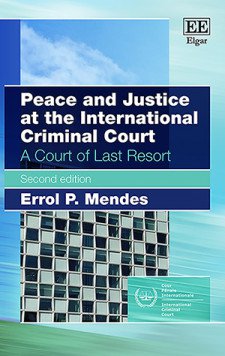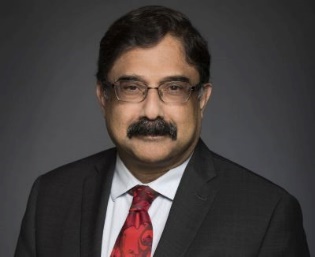September 16, 2019
An Interview with Errol Mendes about his Book “Peace and Justice at the International Criminal Court, a Court of Last Resort”, Second Edition
One of our editors, Joseph Rikhof, posed some questions to Professor Errol Mendes re his book “Peace and Justice at the International Criminal Court, a Court of Last Resort”, Second Edition
Question: One of your endeavours in your illustrious career was the time you spent as a Visiting Professional with the International Criminal Court (ICC) in 2009. We understand that the first edition of Peace and Justice at the International Criminal Court, A Court of Last Resort was related to this assignment at the ICC. To provide some background to both editions of this book, could you tell us a bit about your experience at the ICC, the projects your worked on and your impression of the various organs of the court.
Answer:
I was assigned to the Office of the Chief Prosecutor as a visiting professional. In addition to offering any advice on the cases that the Office was handling, I was also tasked with thinking about how the Office and the Court handles Peace v. Justice issues. This refers to the allegations by some commentators that the Court may have endangered the potential for a sustainable peace by focusing only on prosecuting those who are responsible for the most serious crimes. I preferred to call it the Peace AND Justice issue and I think there is no sustainable peace or justice if they are not equally pursued
I was also asked for an opinion on the ability of the Office to consider a request from the Palestinian Authority to request the Prosecutor to begin an investigation on the alleged crimes in Gaza.
 Question: What were your goals in writing the first edition of the book? Did they change for the second edition? If so, how did they change?
Question: What were your goals in writing the first edition of the book? Did they change for the second edition? If so, how did they change?
Answer:
I wanted to write primarily on the Peace and Justice challenges facing the Court and also on what was becoming a major challenge to the Court, that it was biased against Africa.
Question: Given your extensive experience in writing about global governance and human rights, did writing about the ICC present challenges? If so, what were they?
Answer:
The main challenge was to remind oneself that the Court is essentially a treaty-based institution trying to establish the first permanent global judicial institute to combat impunity for the most serious crimes. However, the fact that the UN Security Council was given jurisdiction to refer cases to the Court complicates that core mandate of the Court and required an examination of how the traditional institutions of global governance fit with this essentially treaty- based organization.
Question: Which conclusions did you draw in the first edition of your book with respect to the ICC?
Answer:
Simply that reading some of the files that I was working on at the Court, listening to the lawyers and the Chief Prosecutor and his Deputy made me realize that the peace v. justice conflict was essentially a false one and that it had to be looked at how both peace and justice are interrelated and had to be reconciled with each other rather than being in conflict.
Question: It would appear that there has been a lot of change at the ICC and the context in which it operates in the last ten years between the first and second edition of this book, especially in the last year. What developments, both good and bad, have you seen at the ICC or with the environment surrounding the ICC in that time period?
Answer:
The second edition delves deeper into the fact that the peace v. justice conflict is a false one especially as regards Darfur, Uganda and to a lesser extent Kenya. The major development sadly has been the failure of high-profile prosecutions and controversial acquittals especially the Bemba ruling. This may well seriously damage the credibility and future of the Court. In addition, the failure of the UN Security Council to assist the Court in terms of compelling the appearance of indicted persons has also affected the long-term viability of the Court, which the second edition focuses on.
Question: What changes over the last ten years have had the biggest impact on the Court? Can you tell me what you think should be done about them?
Answer:
The combination of the failures of high-profile prosecutions and key acquittals combined with the inability to get indicted individuals before the Court is continuing to have the biggest impact on the Court in terms of its credibility and long- term sustainability.
Question: Could you summarize what you want the readers of your new book to learn and to put into action?
Answer:
One of the key messages is to get readers to think about how should we balance the need for a permanent judicial court to combat impunity for the most serious crimes with the fact that it is still a treaty-based organization that must work with a dysfunctional and frankly hypocritical UN Security Council that does long- term damage to the Court by referring major cases with little assistance. Also how does the Court handle the fierce opposition of some of the most powerful global powers like the US?
Question: One of the points you made in your first edition was the need for more international cooperation to make the ICC more effective for the purposes of attaining peace and justice. Is this still your position? What effect do actions such as the recent American challenge to the Court, the Security Council deadlock over Syria and the criticism about the ICC’s seeming concentration on matters in Africa and threats to withdraw have on the possibility of greater cooperation with the Court? Are you hopeful that the Court will continue to move toward peace and justice? What sustains your hope?
Answer:
The second edition precisely spells out these challenges and unless there is more cooperation not only from its own members states but also from civil society and others who support the Court within the US and states that are threatening to withdraw from the Court, the future will be extremely difficult and potentially endanger the sustainability of the Court.
Question: Are the conclusions and observations in your new book related to your 2014 book “Global Governance, Human Rights and International Law; Combating the Tragic Flaw”?
Answer:
In a way they are. As mentioned, the tragic flaw in institutions of global governance are becoming extreme under the Trump Administration which is a fierce critic of the Court and other global institutions. There must be a call to action on the part of countries, civil society and those who see the dangers coming from the increasing power of authoritarian and extremist governments to ensure that the tragic flaw does not return the global community to the periods before the first and second world wars.
Question: There has been some harsh criticism of the ICC in recent months, especially after the decision by the Pre-Trial Chamber in the Afghani decision in April (see for instance: https://www.japantimes.co.jp/opinion/2019/05/17/commentary/world-commentary/end-international-criminal-court/#.XOHf5fZFyUl); what is your view of the state of the ICC at the moment and in the future?
Answer:
As the Afghani decision happened after the book was published, I did not address this question but I strongly critiqued it as an abysmally wrong decision that was based on the misunderstanding of the “interests of justice” principle. The deluge of criticism that the Court has received has furthered damaged its longer-term credibility sadly.
Question: I presume that because of the deadline of the publication of your book not all recent developments with the ICC have been covered; would you like to comment on events at the ICC between the end date of your book and the present?
Answer:
The rulings that happened after the publication like the Afghani decision has furthered by concern about the need for the Court to deeply improve the prosecution strategy, perhaps the need to ensure that the judges have the right knowledge and qualifications to sit on the Court and for member states to have a deep reexamination on how they can demand and effect more cooperation not only from member states but also from the UN Security Council and other global institutions.
Please cite this article as “An Interview with Errol Mendes about his Book “Peace and Justice at the International Criminal Court, a Court of Last Resort”, Second Edition” (2019) 3 PKI Global Justice Journal 68.
About the Author
 Errol P. Mendes is a lawyer, author, professor and has been an advisor to corporations, governments, civil society groups and the United Nations. His teaching, research and consulting interests include constitutional and human rights law, corporate law, global governance, public international law (including humanitarian and international criminal law) and international business and trade law. Professor Mendes has taught, researched, consulted and published extensively in the area of Global Governance, International Business Law and Ethics, Constitutional Law and Human Rights Law. He is Editor-in-Chief of Canada’s leading constitutional law journal, The National Journal of Constitutional Law as well as the author or co-editor of seven books, including The Canadian Charter of Rights and Freedoms, 3rd and 4th Editions (1996 and 2005, co-authored), Towards a Fair Global Labour market: Avoiding the New Slave Trade (1999, co-authored); Democratic Policing and Accountability: Global Perspectives (1999, co-edited); Between Crime and War, Terrorism, Democracy and the Constitution (2003, co-edited); Global Governance, Economy and Law (2003); and Global Governance, Human Rights and International Law. Combating the Tragic Flaw (2014).
Errol P. Mendes is a lawyer, author, professor and has been an advisor to corporations, governments, civil society groups and the United Nations. His teaching, research and consulting interests include constitutional and human rights law, corporate law, global governance, public international law (including humanitarian and international criminal law) and international business and trade law. Professor Mendes has taught, researched, consulted and published extensively in the area of Global Governance, International Business Law and Ethics, Constitutional Law and Human Rights Law. He is Editor-in-Chief of Canada’s leading constitutional law journal, The National Journal of Constitutional Law as well as the author or co-editor of seven books, including The Canadian Charter of Rights and Freedoms, 3rd and 4th Editions (1996 and 2005, co-authored), Towards a Fair Global Labour market: Avoiding the New Slave Trade (1999, co-authored); Democratic Policing and Accountability: Global Perspectives (1999, co-edited); Between Crime and War, Terrorism, Democracy and the Constitution (2003, co-edited); Global Governance, Economy and Law (2003); and Global Governance, Human Rights and International Law. Combating the Tragic Flaw (2014).
Book: https://www.e-elgar.com/shop/peace-and-justice-at-the-international-criminal-court-15746.
Image: Flickr, International Criminal Court, The Hague, author: jbdodane, September 24, 2017, licensed under CC BY-NC 2.0.